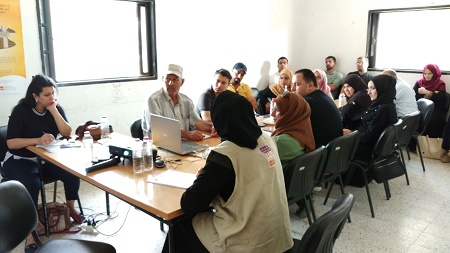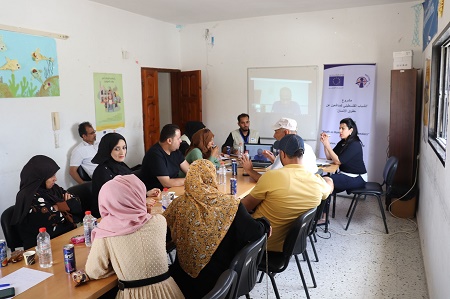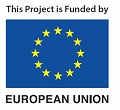|
MIFTAH holds a session on violations documented in the Khan Younis district by the young human rights defenders
Ramallah – 22/6/2020 – On June 18, 2020, MIFTAH held a session in Khan Younis at its partner institution “Dia’ Al Ghad Association” in the southern Gaza Strip. The session was attended by 23 community organization representatives (11 women and 12 men) as part of its EU-funded project “Youth as Human Rights Defenders”, which is implemented in Jerusalem, Hebron and the Gaza Strip. MIFTAH’s human rights defenders team in southern Gaza presented its third quarterly report for the period between January – March 2020, which covers violations to health and labor rights in the southern Gaza Strip areas. A total of 215 violations were documented by the team in the entire Gaza Strip, presented during a meeting that included activists and representatives from community organizations and human rights institutions. The session is part of the discussions and debates launched by MIFTAH with various components of Palestinian society in support of its lobbying and advocacy campaign in the Gaza Strip entitled, “Be safe and sound.” This is part of an inclusive framework for building community partnership in support of the campaign, which sheds light on the violations against farmers and fishermen. The sectors targeted in this campaign are community officials and those affected by these violations.
 The session began with an overview presented by Waad Qannam, MIFTAH’s coordinator for its “Youth as Human Rights Defenders” project and Fatima Ashour, MIFTAH’s field coordinator in the Gaza Strip. They gave a brief explanation of the project’s objectives and activities in both the West Bank and Gaza Strip and the types of violations the project seeks to document in these areas according to their exclusivity. Qannam also presented the objectives of MIFTAH’s lobbying and advocacy campaign “Be safe and sound” in the Gaza Strip, which is aimed at securing international protection to Palestinian farmers and fishermen in Gaza from Israeli occupation violations. Another goal is to protect agricultural soil from chemical pollutants used during Israeli military assaults and sprayed from planes. These chemicals have resulted in widespread health and economic damages for the Palestinian population. A third objective of the campaign is to demand that international parties set up medical posts in the buffer zone along the border. Defenders Arwa Qadeeh and Wael Abu Rajeela presented the recommendations of the quarterly report and explained the most prominent violations documented by the human rights defenders between January and March, 2020 in the southern Gaza Strip before the onset of the coronavirus pandemic. They also explained the importance of documenting human rights violations to later be used as data and indicators when addressing the issue of rights in addition to using this information in advocacy and lobby campaigns.
 A discussion then ensued on the need to support farmers affected by Israeli violations through establishing “safe spots” and safe spaces for harvesting (food security) and protecting local produce from chemical insecticides continuously sprayed by Israeli crop dusters. The participants emphasized the need for international delegations to come to these areas and stand in solidarity with the farmers being targeted by occupation forces. They explained that these delegations could provide the farmers with necessary tools and equipment and secure water tanks for irrigation of their crops, which are under continuous attack by Israeli forces. Other proposals include: providing simple but vital tools to farmers and to set up medical posts for them in the south by organizations with international protection under international humanitarian law; requesting that the Red Cross provide an ambulance around the clock at the border strip; and the need for UNRWA monitoring posts given its capacity as the UN party that protects Palestinian refugees. Another point discussed was the problem of municipality water access to the farmers and continuous power cuts, which also impedes their work and puts an additional burden on them over and above the occupation. The presentations confirmed that the southern Gaza Strip is a marginalized area without access to many services or strong institutional presence, which calls for increased action to ensure the rights of children in these areas who are one of the most marginalized sectors of society. Some doubts were raised regarding the increase in the percentage of cancer patients in the Gaza Strip, with a recorded 12,600 cases this year according to Palestinian Health Ministry data, ostensibly as a result of environmental pollution. One of the direct reasons for this pollution is the continuous spray of unknown pesticides by Israeli crop dusters and the considerable possibility of a link between these pesticides and the increase in cancer cases in the Gaza Strip. That is, there could be a causal relationship between Israeli pesticides and chronic health problems in Gaza, which is why one recommendation stressed on the importance of human rights defenders demand from international parties to provide testing labs for agricultural soil in order to hold Israel accountable for its crimes against humanity. The presentations also confirmed that southern Gaza represents the bread basket for the entire Strip and is an integral part of local production. They maintained that protecting this area and improving the quality of its products would have significant health and economic benefits for its citizens. The participants also discussed the problem of stray dogs which Israeli forces let loose along the border and into Palestinian farmland. The dogs then attack and terrorize the people, especially in the mornings during harvest hours. The participants stressed on the importance of documenting violations against health and labor rights and on the need for coordination with the Independent Commission for Human Rights and other relevant parties addressing these violations at the internal level. Some participants recommended the importance of compensating farmers and those affected by repeated Israeli army assaults, whether by official Palestinian institutions or via international organizations. In addition, they stressed on the importance of raising citizens’ awareness of their rights according to international human rights law so they could also be defenders themselves, in addition to working towards increasing the Ministry of Agriculture’s budget to provide the necessary support for farmers and farmland.
http://www.miftah.org |
